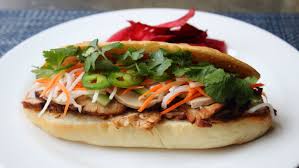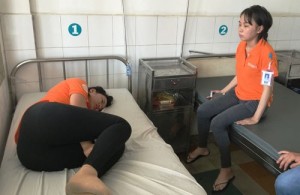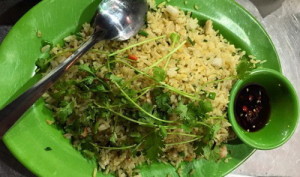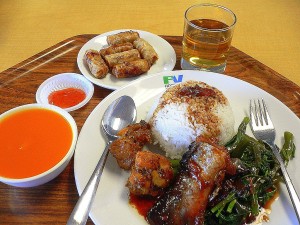Consumption of fast food and street food is increasingly common among Vietnamese, particularly in large cities. The high daily demand for these convenient food services, together with a poor management system, has raised concerns about food hygiene and safety (FHS). This study aimed to examine the FHS knowledge and practices of food processors and sellers in food facilities in Hanoi, Vietnam, and to identify their associated factors.
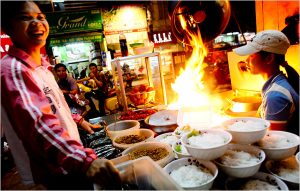 A cross-sectional study was conducted with 1,760 food processors and sellers in restaurants, fast food stores, food stalls, and street vendors in Hanoi in 2015. We assessed each participant’s FHS knowledge using a self-report questionnaire and their FHS practices using a checklist. Tobit regression was used to determine potential factors associated with FHS knowledge and practices, including demographics, training experience, and frequency of health examination.
A cross-sectional study was conducted with 1,760 food processors and sellers in restaurants, fast food stores, food stalls, and street vendors in Hanoi in 2015. We assessed each participant’s FHS knowledge using a self-report questionnaire and their FHS practices using a checklist. Tobit regression was used to determine potential factors associated with FHS knowledge and practices, including demographics, training experience, and frequency of health examination.
Overall, we observed a lack of FHS knowledge among respondents across three domains, including standard requirements for food facilities (18%), food processing procedures (29%), and food poisoning prevention (11%). Only 25.9 and 38.1% of participants used caps and masks, respectively, and 12.8% of food processors reported direct hand contact with food. After adjusting for socioeconomic characteristics, these factors significantly predicted increased FHS knowledge and practice scores: (i) working at restaurants and food stalls, (ii) having FHS training, (iii) having had a physical examination, and (iv) having taken a stool test within the last year.
These findings highlight the need of continuous training to improve FHS knowledge and practices among food processors and food sellers. Moreover, regular monitoring of food facilities, combined with medical examination of their staff, should be performed to ensure food safety.
Evaluating food safety knowledge and practices of food processors and seller working in food facilities in Hanoi, Vietnam, April 2018
Journal of Food Protection, vol 81, no 4
BACH XUAN TRAN,1,2† HOA THI DO,3† LUONG THANH NGUYEN,1 VICTORIA BOGGIANO,4 HUONG THI LE,1 XUAN THANH THI LE,1 NGOC BAO TRINH,1 KHANH NAM DO,1 CUONG TAT NGUYEN,5* THANH TRUNG NGUYEN,5 ANH KIM DANG,1 HUE THI MAI,1 LONG HOANG NGUYEN,6 SELENA THAN,5 and CARL A. LATKIN2

